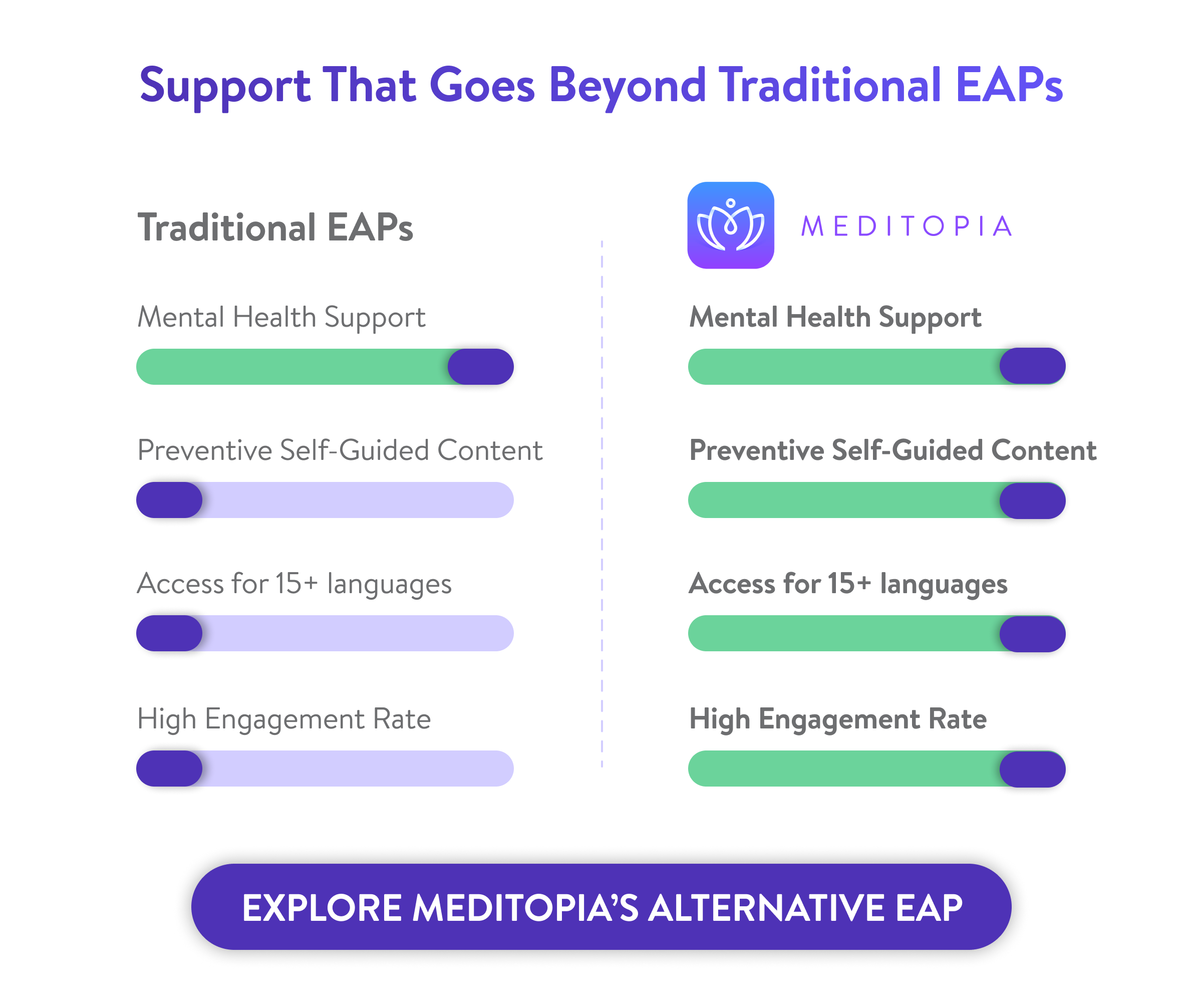One in five New Zealand workers report experiencing work‑related stress “often” or “all the time” [1]. Behind the silent suffering of employees lie real costs: absenteeism, reduced productivity, increased turnover, and reputational risk. However, when properly structured, a workplace‑based EAP serves as a strategic tool to manage risk, improve resilience, and foster a culture of care.
Top EAP Providers in New Zealand
To help HR decision‑makers evaluate choices quickly, below is a side‑by‑side comparison of our six selected EAP vendors in New Zealand. Take a moment to consider your unique corporate needs, and choose a provider that fits them.
1. EAP Services Ltd
EAP Services Ltd (also operating under “Habit Health EAP Services” in NZ) is one of the better-known local providers. They balance in‑country presence, face-to-face capacity, and digital support. Their reputation is rooted in broad service coverage across New Zealand.
Key Services
- Confidential counselling (personal, work, family)
- Manager coaching and support
- Health coaching, physiotherapy, wellness services
Unique Selling Points
- Strong local presence and deep understanding of NZ workplace culture
- Hybrid delivery (face-to-face + online) ensures access for remote or rural staff
- Their in-house “WellbeingHub” helps aggregate content, resources, and self‑help tools
Pricing Structure
They typically use a per employee / tiered pricing model, with costs scaled by organisation size and service scope.
2. Meditopia for Work
Meditopia positions itself as a modern, preventive, digital-first EAP. Its strength lies in marrying content, AI guidance, analytics, and optional human therapy support to drive engagement and outcomes.

Key Services
- Large library of mindfulness, meditation, mental health, physical well‑being content (1000s of items)
- AI assistant and smart guidance (available 24/7)
- Access to professional counselling, psychologists, nutritionists, physiotherapists
- Corporate dashboards & analytics (usage, emotional states, content trends)
- Free integration with existing systems (HR platforms, apps)
Unique Selling Points
- Progress tracking, streaks, challenges, reminders
- 14 languages, making it ideal for remote or international teams
- Emphasis on prevention
- Analytics to measure ROI, see usage patterns, and direct future improvements
Pricing Structure
Meditopia typically offers a PEPM / license‑based model for organizations.
3. Clearhead
Clearhead is a local NZ-founded eap company that blends therapy, self-help content, and organisational insights. It aims to be more than reactive support, positioning itself as proactive and data-driven.
Key Services
- Therapy (in-person, virtual, after-hours)
- Self-directed wellbeing tools & content
- Wellbeing and usage analytics for employers
Unique Selling Points
- Deep organisational insight
- The platform is built with behavioural design principles, encouraging early use, nudges, and self-guided resilience before issues escalate
Pricing Structure
Clearhead uses a per-employee/month pricing structure.
4. OCP (Organisational Counselling Programmes)
OCP is a specialist EAP company grounded in New Zealand with a strong reputation among NZ corporates. They combine classic counselling with workplace training, consulting, and custom programmes.
Key Services
- Confidential counselling for employees (& often immediate family)
- Advisory and consulting for HR and leadership
- Training workshops (stress, resilience, conflict, communication)
Unique Selling Points
- Depth in corporate consulting and custom design, beyond just counselling
- Strong track record in NZ contexts and existing relationships with many NZ firms
- Flexible design: they can embed into HR strategies rather than being a standalone vendor
Pricing Structure
OCP often uses a flat base fee + usage component model.
5. Benestar
Benestar is another well‑established wellness EAP vendor in Australia and New Zealand. It offers a robust blend of clinical services, coaching, and organisational support. In NZ, its operations and digital assets tie into the parent TELUS Health portfolio.
Key Services
- 24/7 counselling and emotional support
- Wellbeing coaching (physical, mental, life)
- Training, workshops, leadership support
Unique Selling Points
- Regional scale (NZ + Australia) gives resilience and resource depth
- Clinically governed, with strong standards of practice
- Ability to support cross‑border organisations in NZ/Australia seamlessly
Pricing Structure
Benestar typically offers a tiered subscription model.
6. Instep EAP
Instep EAP is a more classic approach in this list of EAP companies. It has strong foundations in counseling, critical incident response, and addiction support. They tend to emphasise compliance, professional accreditation, and trusted service.
Key Services
- Confidential counselling (personal, workplace, family)
- Drug & alcohol support and referral
- Critical incident intervention
Unique Selling Points
- Accreditation and compliance
- Good for organisations that want stable, predictable support and deep counseling focus
Pricing Structure
Instep often charges per session or via bundle packages.
Expanded List of EAP companies in New Zealand
How to Choose the Right EAP Provider in New Zealand
Selecting the right Employee Assistance providers can feel overwhelming, especially with so many vendors offering overlapping services. Here are the most important factors to help HR leaders and decision-makers evaluate these services for their unique organisational needs:
- Assess company size and complexity: Larger organisations often benefit from the largest EAP providers with proven infrastructure, diverse services, and scalable support.
- Smaller businesses may prefer agile, niche providers with personalised service.
- Review service delivery options: If your workforce includes remote, hybrid, or field-based employees, look for remote EAP services that are app-based or offer video counselling, asynchronous chat, or online booking tools.
- Evaluate response time and availability: Ensure the provider offers 24/7 support, particularly for counselling and mental health crises. This is non-negotiable for high-stress industries (healthcare, retail, security) or organisations operating on rotating shifts.
- Ensure crisis management readiness: Choose those experienced in crisis intervention, especially if your organisation deals with high-risk environments, traumatic incidents, or safety-sensitive roles.
- Consider the scope of employer-sponsored benefits: A modern EAP should integrate well with your existing employer-sponsored benefits, such as wellness programs, coaching, or manager support training, creating a cohesive ecosystem of employee care.
- Look beyond counselling: The best EAP providers now include proactive resources like emotional wellbeing tools, CBT programs, and preventive coaching, offering more than just reactive support when things go wrong.
- Request transparency in data and outcomes: Leading EAP vendors should provide anonymised usage reporting, insights, and recommendations to help employers continuously improve staff wellbeing strategies.
- Cultural fit and localisation: For New Zealand-based organisations, it's important the provider understands local legislation, cultural dynamics, and can offer bicultural or multilingual support when needed.
Why EAPs Are Essential for Businesses in New Zealand
Implementing an Employee Assistance Program at work is a response to concrete pressures local organisations face. Below are country‑specific reasons why EAPs matter:
- Growing prevalence of psychosocial risk: Over half of mental health concerns in Kiwi workplaces are linked to work-related stress (53 %) and fatigue (27 %) [2]. Bullying, harassment and other psychosocial hazards compound the issue. An effective EAP helps to catch these risk factors before escalation.
- Tangible economic cost to businesses: In 2020, New Zealand lost 7.3 million working days and approximately NZD 1.85 billion in productivity due to work absence related to health, including mental health issues. For decision-makers, that means a compelling ROI for interventions that reduce absence and improve performance.
- Expectation of employer support: Employees are more likely to expect proactive wellbeing support from their employers. In fact, in public sector surveys, around 44 % of public servants report experiencing work stress often or always [3], so offering a comprehensive EAP sends a strong signal of caring and credibility.
- Alignment with health & safety obligations: Under New Zealand’s regulatory framework around workplace health and safety, psychosocial hazards are increasingly recognized.
- Early intervention & stigma reduction potential: Many mental health issues emerge gradually. EAPs provide an early “safe space” for employees to seek help before productivity suffers or conditions worsen. Moreover, studies of EAP effectiveness suggest that early access to counselling or support often reduces the need for more intensive interventions later [4].
- Cultural and local relevance matters: In New Zealand, Māori, Pasifika, and other communities may have distinct cultural perspectives on mental health and help-seeking. Culturaly sensitive EAP providers like Meditopia often offer culturally attuned services, multilingual support, and frameworks that resonate with local norms.
EAP Usage Statistics in New Zealand
So, you are interested in an EAP vender but you are not sure about how they work in New Zealand. Let's take a look at the stats:
- The average engagement rate for EAPs in New Zealand is about 11.62 %. In other words, among employees eligible for an EAP benefit, just over one in ten make use of it in a given period [5].
- This is due to lack of engaging features, updated content, and failed intern benefits communications.
- One source reports that only about 25 % of New Zealand employers currently offer an EAP program to their workforce [6].
- This suggests a large opportunity: many firms have yet to adopt EAPs, which contributes to under‑utilisation from the market side.
- The WorkSafe psychosocial risks report also finds that 53 % of workers report stress, and 27 % report fatigue, in relation to work conditions [7].
- In surveys on workplace wellbeing, many employees report struggling internally (e.g. low energy, difficulty focusing, stress) even while present at work. One NZ survey cited that 47 % of respondents found it hard to enjoy their work, 39 % struggled with job stress, 28 % lacked energy, and 19 % felt hopeless about finishing tasks [8].
Discover EAP Companies by Countries
Looking for more information about the Employee Assistance Program Providers landscape in other regions or countries? Check our blogs and discover what's going on globally regarding EAPs globally.







%2008.07.36_4ffe9739.jpg)

















